- Skyline College has a reputation of being an outstanding, medium-sized, two-year college, rich in diversity. We are known for our student-oriented focus and our faculty and staff are dedicated to ensuring that every student is made to feel welcome. A focus on quality and excellence is a Skyline tradition and at the heart of our academic programs and services.
School Highlights
Skyline College serves 15,483 students (19% of students are full-time).
The college's student:teacher ratio of 43:1 is higher than the state community college average of 32:1.
Minority enrollment is 80% of the student body (majority Asian), which is more than the state average of 77%.
Quick Stats (2025)
- Enrollment: 15,483 students
- In-state tuition: $552
- Out-state tuition: $3,348
- Acceptance Rate: 100%
- Student:teacher ratio: 43:1
- Minority enrollment: 80%
- Source: Verified school update
Top Rankings
Skyline College ranks among the top 20% of public schools in California for:
Category
Attribute
Completion Rates
School Overview
The teacher population of 359 teachers has stayed relatively flat over five years.
Skyline College
(CA) Community College Avg.
Carnegie Classification
Baccalaureate/Associate's Colleges: Associate's Dominant
Baccalaureate/Associate's Colleges: Associate's Dominant
Institution Level
Less than 2 yrs
At least 2 but less than 4 years
Institution Control
Public
Public
Total Faculty
359 staff
294 staff
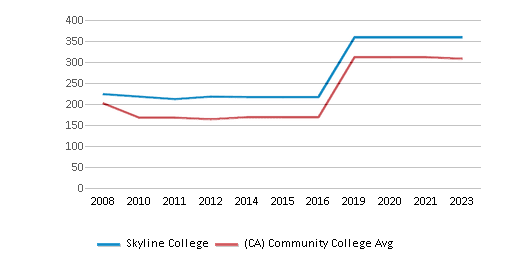
School Calendar
Student Body
The student population of Skyline College has grown by 75% over five years.
The student:teacher ratio of 43:1 has increased from 24:1 over five years.
The Skyline College diversity score of 0.74 is more than the state average of 0.70. The school's diversity has stayed relatively flat over five years.
Total Enrollment
15,483 students
2,311 students
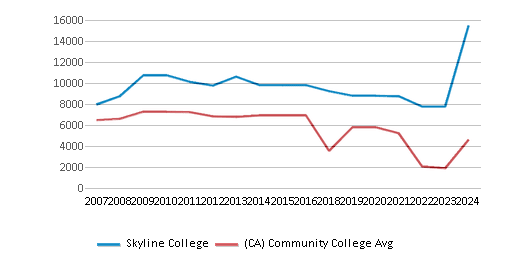
Student : Teacher Ratio
43:1
32:1
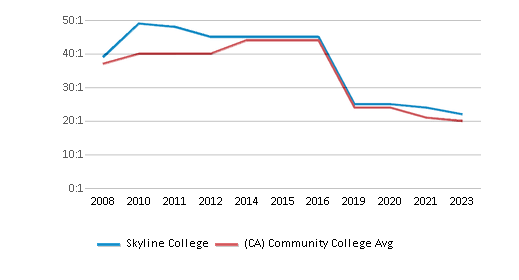
# Full-Time Students
2,984 students
1,232 students
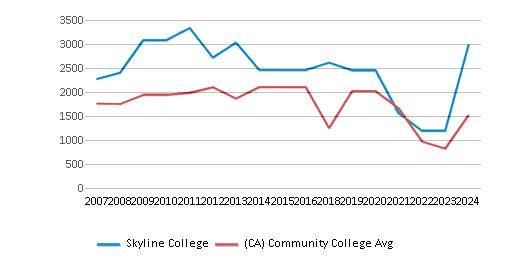
# Part-Time Students
12,499 students
8,299 students
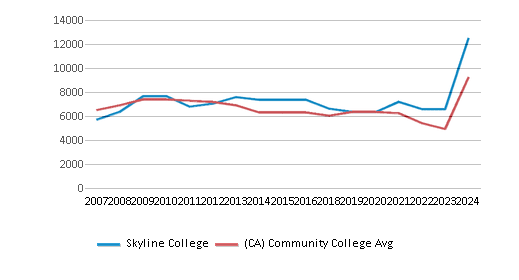
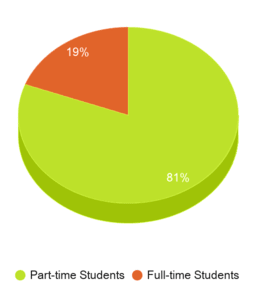
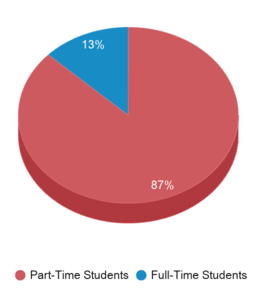
# Enrollment Undergraduate
154 students
240 students
# Full-Time Undergraduate Students
2,984 students
1,155 students
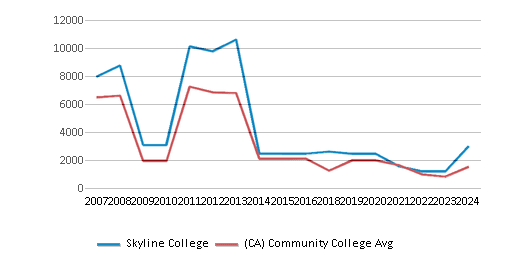
# Full-Time Graduate Students
n/a
63 students
# Part-Time Undergraduate Students
n/a
8,457 students
# Part-Time Graduate Students
n/a
10 students
Total Dormitory Capacity
n/a
140 students
% American Indian/Alaskan
n/a
n/a
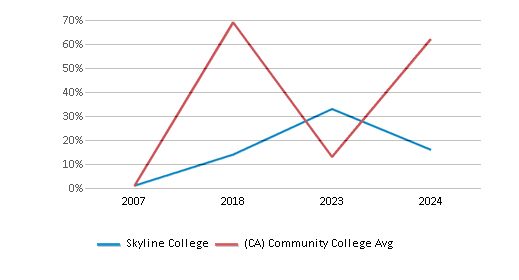
% Asian
34%
13%
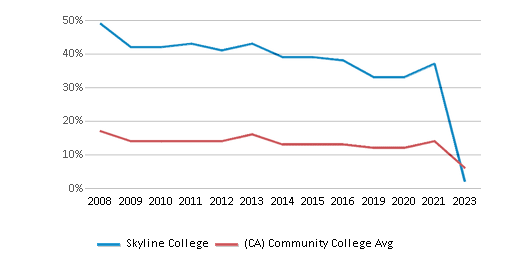
% Hispanic
31%
47%
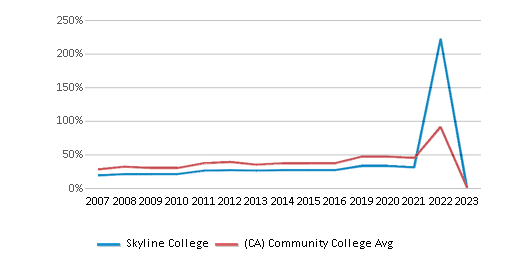
% Black
2%
7%
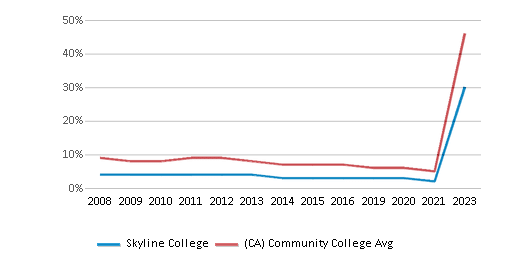
% White
20%
23%
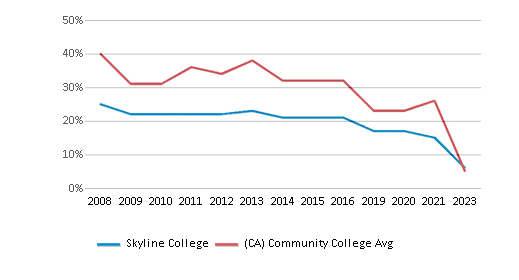
% Hawaiian
1%
1%
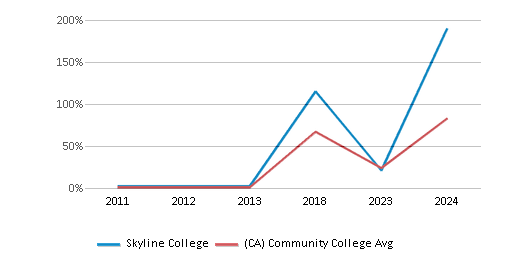
% Two or more races
7%
5%
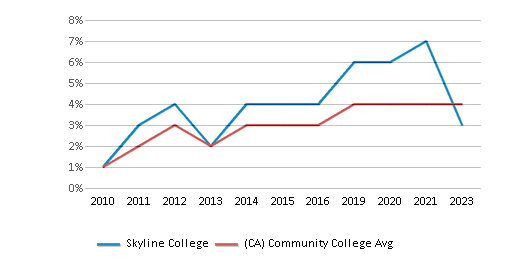
% Non Resident races
3%
1%
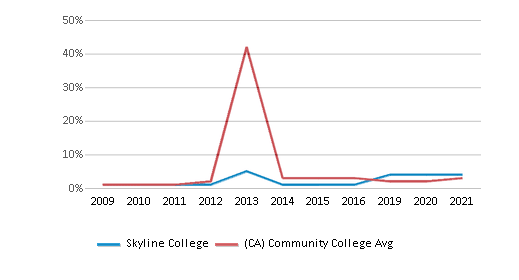
% Unknown races
3%
3%
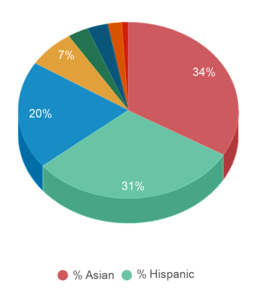
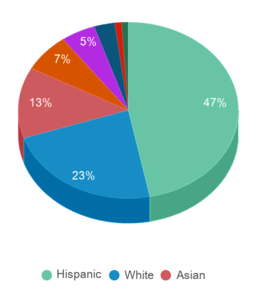
Diversity Score
0.74
0.70
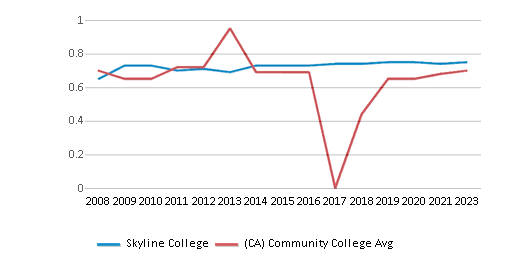
College Completion Rate (Students who graduate in less than 4 years)
22%
0.4221%
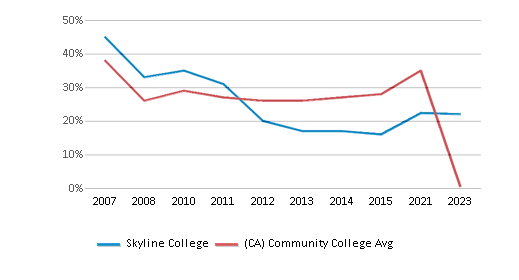
College Completion Rate (Students who graduate in 4 years or more than 4 years)
0.4012%
0.4304%
Average Graduate Earnings (10 Years)
$43,600
$34,700
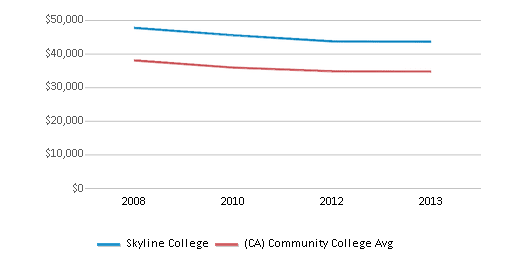
Tuition and Acceptance Rate
The public in-state tuition of $552 is less than the state average of $1,236. The in-state tuition has declined by 59% over four years.
The public out-state tuition of $3,348 is less than the state average of $6,547. The out-state tuition has declined by 62% over four years.
In-State Tuition Fees
$552
$1,236
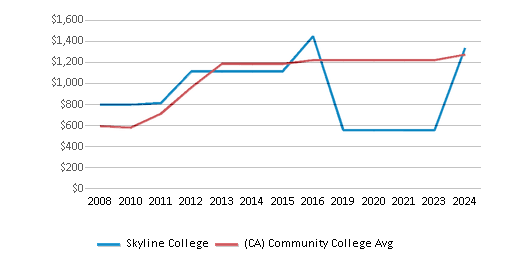
Out-State Tuition Fees
$3,348
$6,547
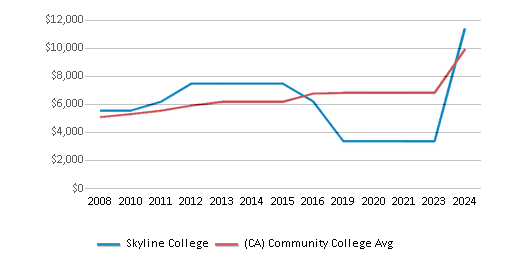
Tuition Notes
12 units per semester for one year.
% Students Receiving Some Financial Aid
71%
85%
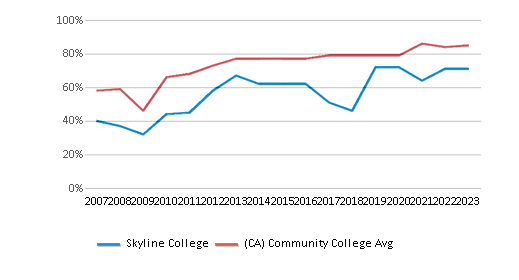
Median Debt for Graduates
$9,500
$10,500
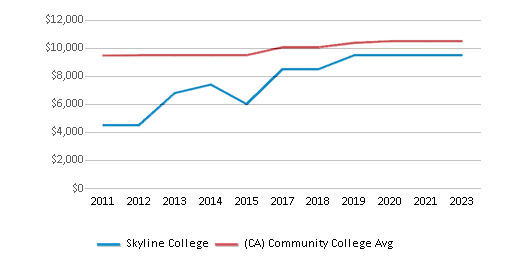
Median Debt for Dropouts
$6,377
$6,239
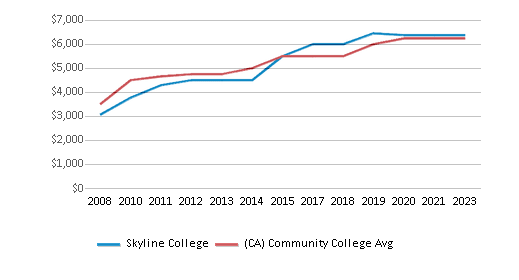
Acceptance Rate
100%
92%
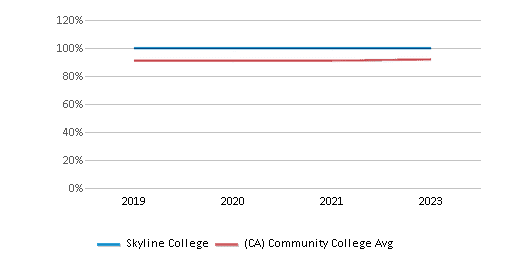
Sports
Total Sports Offered
6 sports
Sports
Badminton, Baseball, Basketball, Soccer, Volleyball, Wrestling
Extracurriculars
Total ExtracurricularsTotal Extra-curric.
34 extracurriculars
ExtracurricularsExtra-curric.
Club or Organization:
Auto Tech Club, Black Student Union (BSU), Ceramics Club, Chinese Students & Scholar Association, Cosmetology Club, Dance Honor Society, Dead Beat Writers, ENACTUS, Engineering & Robotics Club, Environmental Club, Filipino Student Union (FSU), Gospel Show Choir Club, Honors Transfer Club, Internation Student Club, Intervaristy Christian Fellowship, Kappa Beta Delta (KBD), Latino American Student Organization (LASO), Model United Nations (MUN), Native American Club, Phi Theta Kappa (ΦΘΚ) Respiratory Care Club, Rotaract Club, Science and Research Club, Sexuality & Gender Alliance (formerly GSA), Skyline Investment Club, Skyline Journalism Club, Skyline Photography Club, Skyline Women Engineering (SWE), Society for the Advancement of Chicanos & Native Americans in Science (SACNAS), Society of Hispanic Professional Engineers (SHPE), Student Veterans of America (SVA), Student-Parent Association for Children's Education (S.P.A.C.E.), Surgical Technology Club, Theater Club, TRiO Club
Auto Tech Club, Black Student Union (BSU), Ceramics Club, Chinese Students & Scholar Association, Cosmetology Club, Dance Honor Society, Dead Beat Writers, ENACTUS, Engineering & Robotics Club, Environmental Club, Filipino Student Union (FSU), Gospel Show Choir Club, Honors Transfer Club, Internation Student Club, Intervaristy Christian Fellowship, Kappa Beta Delta (KBD), Latino American Student Organization (LASO), Model United Nations (MUN), Native American Club, Phi Theta Kappa (ΦΘΚ) Respiratory Care Club, Rotaract Club, Science and Research Club, Sexuality & Gender Alliance (formerly GSA), Skyline Investment Club, Skyline Journalism Club, Skyline Photography Club, Skyline Women Engineering (SWE), Society for the Advancement of Chicanos & Native Americans in Science (SACNAS), Society of Hispanic Professional Engineers (SHPE), Student Veterans of America (SVA), Student-Parent Association for Children's Education (S.P.A.C.E.), Surgical Technology Club, Theater Club, TRiO Club
Source: 2024 (or latest year available) Integrated Postsecondary Education Data System (IPEDS)
School Notes
- Skyline College is a great place to start your university education-over half of Skyline's students are doing just that. You can complete the first two years (lower division) of university at Skyline College and then transfer to a four-year school to earn your bachelor's degree. Many, if not most, of our courses are transferable to a four-year school so you can take classes at Skyline that fulfill the lower-division general education requirements at a four-year school. In addition, Skyline offers courses that are articulated with campuses of the California State University System (CSU), the University of California (UC), and Bay Area private colleges. This means the class is the same as that offered at the CSU or UC campus. For 35 years, Skyline College has been one of the best community colleges in the state. Thousands of Northern San Mateo County community members have benefited in one way or another by completing coursework at Skyline. Whether you seek a college degree, new job skills, transfer to a university, or are taking classes for personal enrichment or recreation, Skyline College is here for you. We are excited at the prospect of helping you in the process of improving your life. All Skyline faculty and staff are committed to your success. University caliber faculty and vocational experts provide personalized instruction in small class sizes, giving you the attention you deserve. Support services such as the One-Stop Student Services Center, the Center for Advanced Learning and Technology, the TLC (Tutoring and Learning Center) and our Childcare Center are in place to assist you in reaching your goals.
Frequently Asked Questions
How much does Skyline College cost?
Skyline College's tuition is approximately $552 for In-State students and $3,348 for Out-State students.
What schools are Skyline College often compared to?
Skyline Collegeis often viewed alongside schools like City College of San Francisco by visitors of our site.
What is the acceptance rate of Skyline College?
The acceptance rate of Skyline College is 100%, which is higher than the state average of 92%.
What sports does Skyline College offer?
Skyline College offers 6 interscholastic sports: Badminton, Baseball, Basketball, Soccer, Volleyball and Wrestling.
What is Skyline College's ranking?
Skyline College ranks among the top 20% of community college in California for: Highest completion rates.
Recent Articles

Obtaining Your Bachelor's Degree at a Community College
Explore the evolving landscape of community colleges offering bachelor's degrees, addressing affordability, accessibility, and workforce needs.

A to Z of Community College Certificates and Courses
From business and healthcare to technology and skilled trades, the article showcases the breadth of options available to students seeking to enhance their knowledge, develop new skills, or pursue career advancement.

What is a Community College?
This comprehensive guide explains what a community college is, its history, and its role in higher education. It covers the types of programs offered, differences from four-year colleges, benefits of attending, and important considerations for prospective students, providing valuable insights for those exploring educational options.









